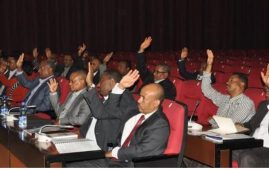A recently published leaked Cable of the US Embassy Asmara reveals that the recently launched Gold mining project will not rescue Isaias Afeworki’s shattered war economy. Despite what the Eritrean president has been trying to convince his people and much of the world, the revenues from the Gold will only cover the capital and the infrastructure costs of the Canadian Company which is commission to extract the zinc and copper beneath the Gold.
The relevant paragraph of the Cable, SUBJECT: IS ERITREA UNRAVELING?, states:
Gold To the Rescue? No
——————————
Many Eritrean businessmen and officials hope, and opposition members fear, that come 2010, gold mining will provide the economic fillip needed to rescue the economy and the regime. Mining company executives tell us these hopes and fears are grossly misplaced. Nevsun is the Canadian company leading the development of the large Bisha gold, copper, and zinc field. Nevsun employees say Bisha is like Neapolitan ice cream, with a thin layer of gold atop thicker layers of copper and zinc. Nevsun’s agreement is heavily front-loaded for cost recovery, meaning for the first two years (the life of the gold extraction) almost all revenues will accrue to Nevsun for capital and infrastructure costs. The gold will be flown from Bisha directly to Switzerland. While the government will get some revenues from taxes and royalties, it is only with the beginning of copper extraction in 2012 or 2013 and zinc five years later that the government of Eritrea will see much return on its investment. In short, there is no help on the immediate horizon for Eritrea’s faltering economy.
The rest five leaked Cables of the US Embassy Asmara, so far published by Wikileaks, are no less informative as well as entertaining.
A Cable, titled BIO NOTES ON ERITREAN PRESIDENT ISAIAS AFWERKI , provides some interesting details into the personality of the Eritrean President.
The Cable states:
1/ Isaias, 62, told a visiting German parliamentarian in late 2008 that he is healthy and expects to live another 40 or 50 years. He said he hopes to serve his country as long as he is able.
2/ In 1996, while returning from a vacation in Kenya, Isaias, his family, and his inner entourage stopped in Addis, where Meles offered to fly them back to Asmara in one of his aircraft. Isaias accepted the offer; en route the aircraft caught fire, but managed to turn back and land safely in Addis. According to someone who was on the aircraft, an infuriatd Isaias accuse Meles to his face of trying to kill him and his family. Isaias has not trusted Meles since, according to this source.
3/ Isaias thinks the United States will attempt to kill him by missile strike on his residence in the city of Massawa, according to late 2007 information from the Force Commander of UNMEE.
4/ Isaias has berated the Chinese ambassador in Asmara for China’s embrace of market capitalism.
5/ Isaias was sent to China by the Eritrean Liberation Front for political commissar training in the 1960s, where, according to the Chinese ambassador, “he learned all the wrong things.”
6/ At a January 2008 dinner he hosted for a codel and embassy officials, Isaias became involved in a heated discussion with his Amcit legal advisor about some tomato seedlings the legal advisor provided to Isaias’ wife. Isaias complained that despite tender care by his wife, the plants produced only tiny tomatoes. When the legal advisor explained that they were cherry tomatoes and were supposed to be small, Isaias lost his temper and stormed out of the venue, much to the surprise of everyone, including his security detail.
7/ Isaias asked to be named the patron of the World Bank-funded Cultural Assets Rehabilitation Project (CARP). When individuals involved with CARP published the book “Asmara: Africa’s Secret Modernist City,” it failed to include a note of thanks to CARP’s patron. Isaias was miffed and shut down CARP.
8/ Isaias has an aversion to talking on the telephone and frequently sleeps in different locations to foil a coup or assassination attempt. During the winter months he spends most of his time in Massawa rather than in Asmara. When dining in restaurants, Isaias will often switch plates with a subordinate, apparently to avoid being poisoned, according to the Qatari ambassador.
9/ The Early Years of Little Beer Pot: Isaias’ father, Afwerki, comes from the village of Tselot, which is perched on the lip of a 7,000′ escarpment four miles southeast of Asmara. When Isaias was a boy Afwerki reportedly spent much of his time in Tigray, where he owned a coffee farm that was later nationalized by the Derg. With Afwerki largely absent, Isaias lived with his mother (rumored to have family roots in Tigray) in a working class neighborhood in eastern Asmara near the train depot and the Lutheran church. Isaias’ mother made and sold a traditional beer called sewa. By some accounts, Isaias was nicknamed the Tigrinya equivalent of “Beer Pot,” after the ceramic jug from which sewa is dispensed.Q Qoday he is a QeQvy whisky drinker, but perhaps as a youth his nickname referred as much to his habits as to his mother’s business.
10/ When a visiting U.S. movie star in early 2008 raised the plight of two Embassy Asmara FSNs who have been imprisoned without charge since 2001, Isaias glared stonily at her and replied, “Would you like me to hold a trial and then hang them?”
You may get all the six Cables from the US Embassy Asmara [HERE].





